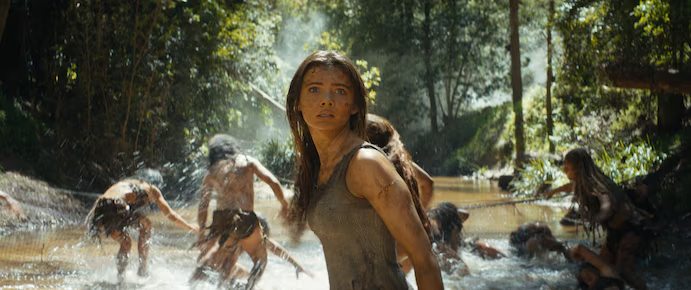
“Kingdom of the Planet of the Apes” is a strong new installment in the revitalized Planet of the Apes franchise, which is one of the more economically and artistically successful second outings of Hollywood’s contemporary corporate period. However, the film, like its three predecessors, is an interesting example of form following content. The CGI chimpanzees, gorillas, and orangutans in movies have grown remarkably lifelike, thanks to advancements in digital technology. However, the people they are replacing, both in the series’ plot and in future installments, are starting to become more and more two-dimensional.
Given the development of AI and a cursory look at the news, perhaps it would be best to let the pixel monkeys take over permanently.
“Kingdom” keeps us in the free fall while they continue on their upward trajectory. The new film, which is set 300 years after the events of the previous three “Apes” films (the excellent “Dawn of the Planet of the Apes” (2014), “War for the Planet of the Apes” (2017), and “Rise of the Planet of the Apes” (2011)), revolves around Noa (Owen Teague, minus the digital hair suit), a promising young simian living in a tranquil village of chimpanzees that train eagles.
With a dizzying leap, swing, and ascent to the summit of the jungle-covered ruins of human skyscrapers, where Noa and his friends Soona (Lydia Peckham) and Anaya (Travis Jeffrey) gather eagle eggs for their coming-of-age ceremony, the opening scene of the film immediately demonstrates what he and the film’s army of digital artisans are capable of.

A army of warlike gorillas led by the formidable Sylva (Eka Darville) attacks the village and enslaves the chimps in a scene straight out of a Joseph Campbell playbook, leaving Noa alone in the world and promising to save his people. The attack on the settlement is shown in “Kingdom,” which has already made a name for itself as the most action-packed installment of the revived “Apes,” in a fluidly propulsive and mercilessly effective manner. Director Wes Ball is skilled at creating virtual worlds; he honed his craft on the dystopian YA adaptation “The Maze Runner” (2014) and its continuations. Perhaps too skillfully; there are times in “Kingdom” when it feels more like a cutting-edge computer game than a motion picture.
On the treacherous trek to the seaside fortress of Proximus Caesar (Kevin Durand), a despotic bonobo ape with the typical villain’s objective (conquer the globe, collect mystical abilities, taunt the hero from behind a dinner table), things both improve and degenerate. As he travels, Noa meets Raka, a learned orangutan who is the last surviving member of a priesthood honoring the name and legend of the original Caesar (played by Andy Serkis in the first three films). Actor Peter Macon gives Raka life, wit, and fantastic comedic timing; he’s like a cross between Yoda and Robert Downey Jr.
Along the way, Noa meets Mae (Freya Allan), a young human lady with her own goals, and the three of them travel like a furry version of “The Wizard of Oz.” Allan does a passable job, but her role never makes sense. To begin with, it’s puzzling how Mae manages to walk into a run-down human stronghold and turn on the electricity and computer system. She serves more as a plot mechanism than a human being, and the actress’s movie-star attractiveness contradicts the idea that humanity is devolving.
It appears as though the lip gloss was applied after the hair and cosmetics crew splashed some muck on her face. At the end of “Kingdom,” we catch a peek of other humans, and they’re ridiculously attractive as well, so I guess total social breakdown was effective in eliminating the ugly genes.

However, I’m being picky, since this film is essentially about apes the entire time, even with William H. Macy making a late-night cameo as a court jester and house pet. “Kingdom” is going to be a huge smash because it creates a really tactile world, the storyline is straightforward and powerful, and the main performances—aside from Allan—are as fascinating as they should be. Even though Teague’s pixelated “costume” makes him strangely resemble Mikey Day from “Saturday Night Live,” he convinces us of Noa’s emotional suffering and developing leadership qualities. Teague portrayed the son in the excellent indie comedy “You Hurt My Feelings” last year.
(I’m sorry if you are unable to remove that.) As already noted, Macon serves as a mid-film high point as Raka, and Durand gives King Proximus the swagger of a bully who is aware of his weaknesses and afraid that someone will find them. Fears that any Planet of the Apes chapters sans Serkis would face an uphill fight are unfounded.
This takes us to a fascinating turning point in the development of the series. The first installment of a new trilogy, “Kingdom of the Planet of the Apes,” has been revealed. While the thought-provoking and even philosophical apocalyptic drama of the first three films is no longer relevant, filmmaking technology has advanced to the point where most viewers are willing to follow Noa and his primate friends wherever they go. The issue is with the people. For the chimps, the film represents progress, but it takes a few steps backward for humanity.
